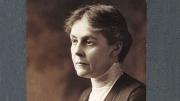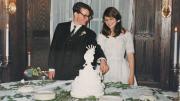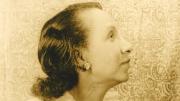The following is an extended sampling of writing by Hendrik Hertzberg '65, staff writer for the New Yorker, "...where he has since become the most stylish liberal political essayist in America. The magazine's "Talk of the Town" section characteristically opens with a thoughtful reflection on some recent news event (under the red-ink heading "Comment") usually written by Hertzberg. Many of the New Yorker's 900,000 readers seize upon his witty, perspicacious columns as a kind of weekly map through the trackless turmoil of the news..."
To a truly effete Harvard snob, the fact that Dukakis went to Harvard Law School and later taught at the John F. Kennedy School of Government no more makes him a Harvard man than the fact that he might secure his bicycle with a Yale lock would make him a Yale man. Referring to these places as "the Ivies" is a dead giveaway that he is a product of none of them.
~New Republic, August 8–15, 1988
"We are not gray grains of oatmeal in a porridge of privilege," said Lloyd Bentsen in his acceptance speech at the Democratic convention. Just so. Also, we are not cowflops of complacency in a meadow of mediocrity. We are not quasars of querulousness in a galaxy of greed. We are not pousse-cafés of presumption in a cocktail lounge of cronyism. We are not BMWs of braggadocio on a parkway of plutocracy. We are not courtesans of callousness in a massage parlor of mendacity. We are not sun-dried tomatoes of sanctimony in a warm salad of wealth.
~New Republic, August 22, 1988
On Ronald Reagan's autobiography, An American Life:
Has Reagan read this book? Besides the printed tome, there is also an audio version—two cassettes with a total running time of 180 minutes, on which Reagan, in his seductive announcer's voice, recites excerpts aloud. According to my calculation, the tapes represent about 32,000 of the roughly 260,000 words in the printed text. The evidence, then, is that Reagan has read at least 12 percent of his book. Trust, but verify.
~New Republic, September 9, 1991
In 1976, in Buckley v. Valeo, the Court decreed that it was O.K. for Congress to have capped individual campaign contributions at a thousand dollars, but not when the contributor happens to be the candidate. Thanks to that decision, rich candidates can spend as much of their own money as they like on their own campaigns. Of course, poor candidates can do the same thing: they, too, can spend as much of their own money as they like. The Court's justice is majestic in its evenhandedness.
~New Yorker, October 18–25, 1999
New Hampshire is shaped like a wine bottle, and most of its million-plus people have settled like silt at the bottom—the bottom, of course, being where political campaigns feed....
Florida tried to move its primary to the same date as New Hampshire's, the first in a series of acts of aggression to which New Hampshire has responded like the Tsar's army drawing Napoleon into the wintry wastes of Russia. Back and back the date of the New Hampshire primary has fallen, election by election...The gates of Moscow won't be reached until the New Hampshire primary is held on the day after the previous election.
~New Yorker, January 31, 2000
...it is hard to imagine that a political convention will ever again make a political decision. Presidential politics has evolved along the line of men's tennis: all serve and no volley, no long rallies....The conventions now serve a niche public, like the opera.
~New Yorker, August 14, 2000
As for hypocrisy, the multicultural, dark-skinned pageant staged by the Republicans caused that cruel word to be much bandied about. White audience, black performers: some were reminded of the N.B.A. finals, others of a rap concert in the suburbs, still others, more sourly, of a minstrel show. Yet there are worse vices than hypocrisy. Paying tribute to virtue can be the first step toward acquiring it. One has to start somewhere.
~New Yorker, August 14, 2000
...the Republicans have never seemed as ready as their opponents to entertain the possibility of defeat. Their presumptive bitterness has been disturbingly disproportionate, as if they had refocused the anger and contempt they felt for Clinton during the impeachment squarely onto Gore. Lincoln's civil war ended in a courthouse. This year's pale copy has begun in one, and nobody can be sure that charity will soften its end.
~New Yorker, December 18, 2000
Gore's plurality is nearly five times the size of John F. Kennedy's over Richard Nixon, in 1960, and thirty thousand votes bigger than Nixon's over Hubert Humphrey, in 1968. The margin in those two races is routinely described as razor-thin. This time, the margin is razor-thin, too, but it's a strange sort of razor: a negative razor, a Rogaine razor, a razor that would grow whiskers on Occam himself—a razor whose edge, like some post-Newtonian astronomical singularity, is so exotically thin that it pops through a wormhole into an alternate universe where the dull outcuts the keen....
Like the process that decided the Presidential election, the filibuster is legal, constitutional, and an affront to democratic (if not to "republican") values. It should not be used promiscuously. But it, and the threat of it, should be used. Two wrongs can't make a right, but sometimes a small wrong can limit a big one's damage.
~New Yorker, January 15, 2001
On the inauguration of George W. Bush as president:
This year's ceremony was bound to be a trifle awkward where both victory and democracy were concerned, given that the one has come at the expense of the other.
~New Yorker, January 29, 2001
George W. Bush's first week as President of the United States began with a speech that, taken as a whole and judged purely as a piece of writing, was shockingly good. It was by far the best Inaugural Address in forty years...In substance if not in expression, it was a speech that, with five minutes of blue-penciling, could as easily have been delivered by the rightful winner of the election.
~New Yorker, February 5, 2001
On the government's attempt to suppress broadcast of Al Qaeda videotapes:
We're hardwired for high anxiety, thanks in some measure to our newest public utility, the 24/7 cable-news-television industry.... When the élites get jumpy, nervousness trickles down....Their newly refined audience-holding technique—a grim anchor delivering one piece of bad news at the top of the screen, an endless readout of more crawling across the bottom, and a screaming graphic ("America's new war") in between—is a hologram of jangled distraction....the notion that Bin Laden's "ideas" can have the slightest effect on American resolve is an insult. Americans need protection from him, to be sure. But not this kind.
~New Yorker, October 29, 2001
...President-elect Bush served up a plateful of bones to the constituency [the religious right] that, he thought, President Bush had fatally neglected. Among those bones was the femur of a tyrannosaur: the nomination of John Ashcroft as Attorney General....Undeniably, foreign nationals have fewer constitutional rights than do American citizens, and it is foreign nationals who will be most affected by Ashcroft's actions. But the rights the United States is supposed to stand for are not just constitutional. They are human....some diminution of civil liberty is going to be inevitable in the war on terrorism, and the discretion left to the Attorney General, already large, will inevitably grow larger than ever....The President frequently says that the war on terrorism will require sacrifice. John Ashcroft is one sacrifice that should be asked of him.
~New Yorker, December 10, 2001
On a Bush administr ation document about national security:
Whatever became of the conservative suspicion of untrammeled power, the conservative insight that good intentions are not, are never, enough? Where is the conservative belief in limited government, in checks and balances? Burke spins in his grave. Madison and Hamilton torque it up, too.
~New Yorker, October 14–21, 2002
On Al Gore's reaction to the 2000 election:
The victory of a popular-vote loser in the Electoral College, the leakiest old vessel of all, would have created a ticklish dilemma even if it had happened cleanly....he [Gore] fell silent. He did not accept—and apparently did not perceive—the responsibility that his popular-vote victory had laid upon him....at a crucial moment he essentially left voiceless those who had placed their trust in him.
~New Yorker, November 4, 2002





